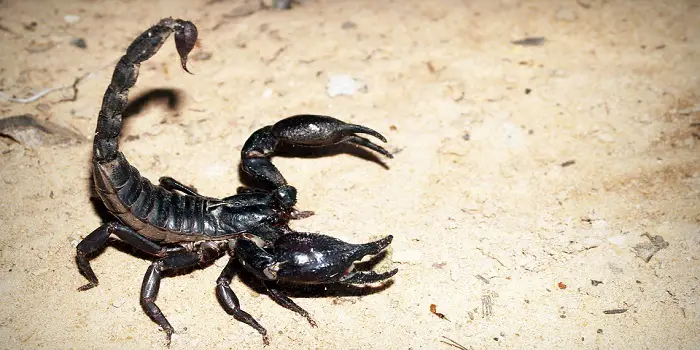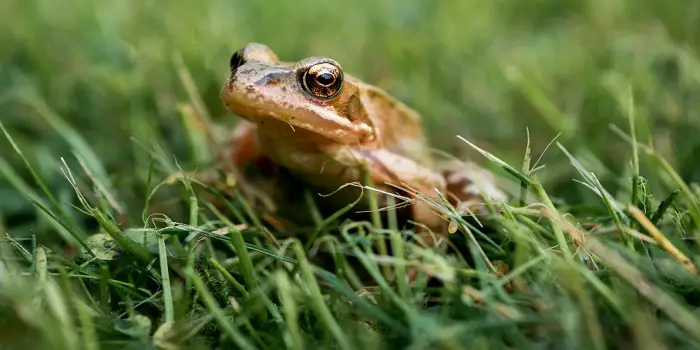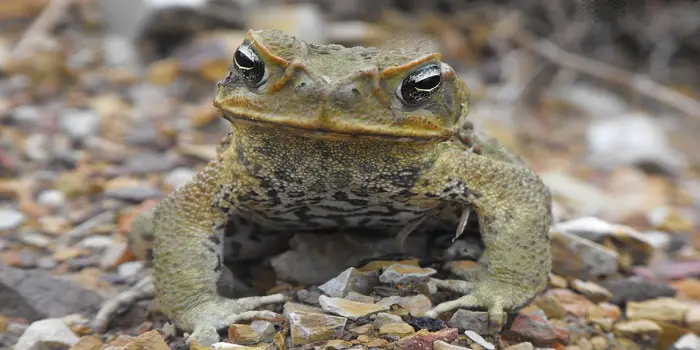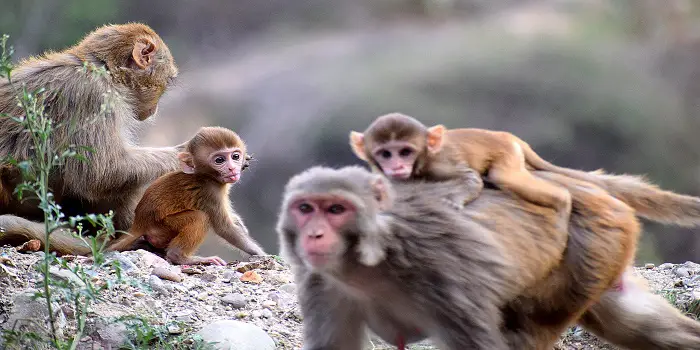
While some farmers plan for getting the highest potential crop yield before the start of the farm season, others don’t go for specific planning.
Whether a farmer does proper planning while hoping for the best, all the farmers have to prepare for the worst and combat different challenges and hindrances which require them to continuously keep a check on their productivity, leading to final success.
A lot of stress is given to the protection of crops from weeds, pests, insects, and diseases along with also safeguarding them from unfavorable weather conditions such as hail or frost, extra rain, or extra sunlight.
Most of the above-mentioned challenges are taken care of from time to time by farmers and even the homeowners who want to grow a few crops in their backyard garden.
However, one which a farmer often faces but fails to realize is the protection of their crops from wild monkeys.
Monkeys and Crop Damage
Monkeys, when present in large troops, are a major problem for farmers across the globe as they are known to cause severe damage to crops.
They harm the plants by eating different crop parts or just by running over the field and trampling the field of plants.
They may also cause severe yield losses and lead to additional monetary issues.
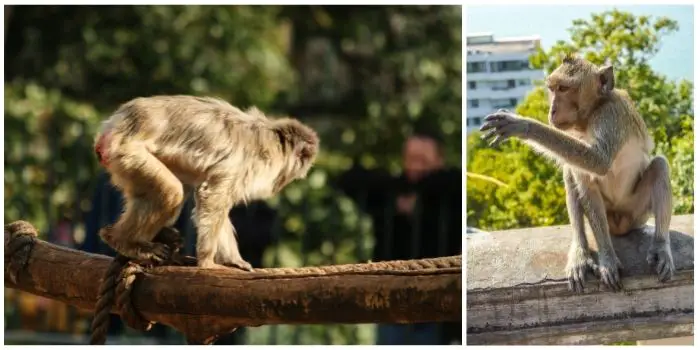
7 Ways to Stop Monkeys from Destroying Crops
It’s a fact that monkeys are very smart beings, so you cannot fool them for long.
Another point to consider is that the protection of crops from monkeys requires a cautionary approach.
Knowing how to protect crops from monkeys and implementing strategies that can work is therefore important.
Here are some time-proven and tested tricks that can help you in keeping them at bay from your farms without causing any serious potential harm to them.
1- Farm fences
Fencing a farm is a common animal protection practice and can be used for monkeys too.
Remember that the fencing quality and how long it lasts depends on the structure and material.
Based on how the fence has been made and what it has been made of, some permanent fences may have a lifespan of about 30 years.
Although fencing has been in use for the past several years, some local and state bodies may prohibit or restrict the use of some kind of fences.
Hence, before choosing a fence to protect your farm and crops, check your local law regulations.
Farmers majorly use one of the below-mentioned lists of fences.
a) Wire fences:
These are made of metal wires woven together to create a barrier.
They are highly durable, effective, and need relatively low maintenance.
However, they are costly and only suggested for the safety of high-value crops.
b) Plastic fences:
These fences are usually less costly and simple to install and repair in comparison to other kinds of fences.
They are accepted almost everywhere, but the only con is that they have a short lifespan of just ten years.
If the area has a high possibility of monkey crop damage, then its efficacy is questionable.
c) Electric fences:
These types of fencing are designed to give an electric shock to monkeys as soon as they come in contact with the fence, thereby preventing them from entering the area.
They are durable and offer effective protection to crops. The cost differs depending on the kind and size of the area they cover.
However, before buying electric fences, make sure they are allowed in your area for protection.
Also, make sure that you mark the electric fences with a warning sign to avoid any human contact.
d) Beehive fencing:
A beehive is basically an enclosed structure where honey bees live and raise their young.
Since monkeys are afraid of bees, beehive fencing can be used to repel monkeys (elephants and other wild animals).
Plus, it also helps you earn an additional source of income.
e) Biophysical barriers:
These are typically the type of fences made from bamboo sticks, coconut tree branches, and other shrubs.
These are low-budget options that many farmers use for the protection of their crops from monkeys and other digging animals.
2- Natural repellents
Some farmers opt for natural remedies instead of mechanical measures like fencing.
Fortunately, there are several natural options to protect crops from monkeys. Some of them are given below:
a) Smoke:
In some places, farmers burn elephant dung or any other item which smolders to create heavy smoke to keep the monkeys away.
b) Fish or garlic repellents:
Since the pungent smell of fish or garlic repels many wild animals, they are known to repel monkeys, deer, and rabbits.
c) Chilli peppers:
Chilli peppers have the chemical capsaicin making them very hot.
It serves as a great repulsion for monkeys, elephants, rodents, and other wild animals.
Farmers who plant chili peppers also can gain additional income from it.
3- Chemical repellents
Often farmers also use active substances and chemicals like Methyl Anthranilate, Anthraquinone, and Butanethiol to keep monkeys away from their yield.
The only drawback of using this method is it can be toxic.
And hence if you have pets nearby, you should avoid using the chemicals.
4- Scaring the monkeys
Apart from the above-mentioned remedies, some farmers also use scarecrows, bright lights, fire/crackers, pet dogs, and drums to scare the monkeys away from their farms.
Monkeys are often scared of snakes.
So, you can also trick them by hanging some colorful fake toy snakes around your farm, plants, and trees.
But remember, you cannot fool them for long using this trick as the monkeys are intelligent enough to find the truth very soon.
5- Trained Langur
Gray langur (also called the Hanuman langur or Hanuman monkey) is mostly found in Asian countries.
Since the monkeys are believed to be afraid of black-faced langur, these can be trained to scare away wild monkeys from the farm.
If you have a tamed/trained langur, you can tie it near the crops to protect them from unruly monkeys and other wild animals.
6- Loud Noises and Sounds
Playing the loud sounds of predator animals (like tigers, lions, etc.) can also be effective in keeping away the monkeys from your farm.
Monkeys also hate weird unknown sounds that make them feel irritated.
So, if you want, you can also try other loud noises like FM radio, loud music, sounds of the marketplace, etc.
Farmers may use ultrasonic electronic repellent since it doesn’t harm humans and has high-frequency sound waves, which help repel monkeys.
Also, they are environmentally friendly, efficient, and durable methods for the protection of your crops, which deter monkeys without causing any harm to them.
7- Discourage them from coming
One important reason why monkey troops keep coming back to your farm, backyard, property, or at the terrace of the building is they feel welcomed.
Most likely, they will be attracted to the easily accessible food in the form of fruit trees, veggies, or bins you place in your yard.
To discourage them from coming, you should follow these steps:
- Always use monkey-proof bins with a lid
- Avoid using plastic bags that attract curious monkeys
- Monkey-proof your house by using a mesh covering and closing windows
- Harvest the fruit trees regularly, and pick them from trees as soon as possible
- Cover the growing crops and vegetables with a strong wire mesh
In addition to all the above remedies, modern farm technology researchers are developing new technological measures (like using cameras, computers, AI, and robots) to secure plants from monkeys.
But till the time advanced technology comes into action, farmers can use the best practices from the above solutions and safeguard their crops from monkeys and other wild animals.
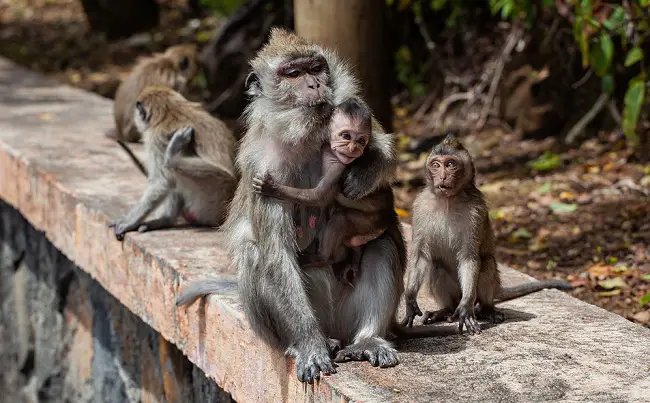
Why Are Monkeys So Dangerous?
In addition to damaging your crops, primates can carry parasites and zoonotic diseases.
They can also be carrying rabies, tetanus, or some deadly herpes that can be very dangerous to humans.
Certain species come out at night and have a very poisonous bite that can even kill a human or pet.
Even though monkeys near you may seem to be in good health, when they scratch or bite, you may suffer from various diseases.
Moreover, if monkeys turn out to be aggressive and happen to come inside your property, they can create a real mess that can be hard to deal with.
What to Do If You Are Attacked by Monkeys?
Surprisingly, monkey bites are common all around the world.
Most likely, if they feel threatened, they may attack or injure you.
If you confront them and want to avoid the attack, do not panic and stay calm.
1- Show them you don’t have anything in hand
Most of the time, monkeys will attack because they think you have something in your hand to eat.
If you do not have anything, open and show them your palms are empty.
If you have something, try to throw them near to them but not on them.
If you have something other than food, let the monkeys steal them from you.
They will most likely drop it when they find it not useful.
2- Avoid eye contact and do not try to run away
If you turn your back on monkeys, it’s a sign that you are inferior, and they will most likely attack you.
You should instead try to back away slowly without screaming or making any noise.
Do not ever try to fight off a monkey. They may scratch or bite, which can be very dangerous for your health.
Just in case you experience an injury or scratch, wash your wounds with water and soap.
If possible, seek advice from your doctor as soon as possible to avoid the chances of getting any health issues.
The Conclusion
Successful farmers always keep a check on their fields as often as they can manage.
After all, regular monitoring is the most effective way to ensure that everything on the field is going according to him.
Since wild animals like monkeys, boars, deer, and small rodents can be highly damaging, in an effort to ensure the highest crop yield, farmers also need to combine two or more crop protection remedies.
These will together be effective in controlling the monkey menace significantly.
Share the post "7 Tricks to Prevent Monkey Troops from Destroying Crops?"

Welcome to ProShieldPest.com. I am Tina Jones. I have been working as a pest removal professional in Winslow, Arizona lately. At present, I love to spend my time with my family as a retiree.
Here I share all my knowledge and experiences to help people understand better how they can stop pests at their homes without actually killing them. Hopefully, the information you will find here will help in safeguarding your home! You can check more about me here.

